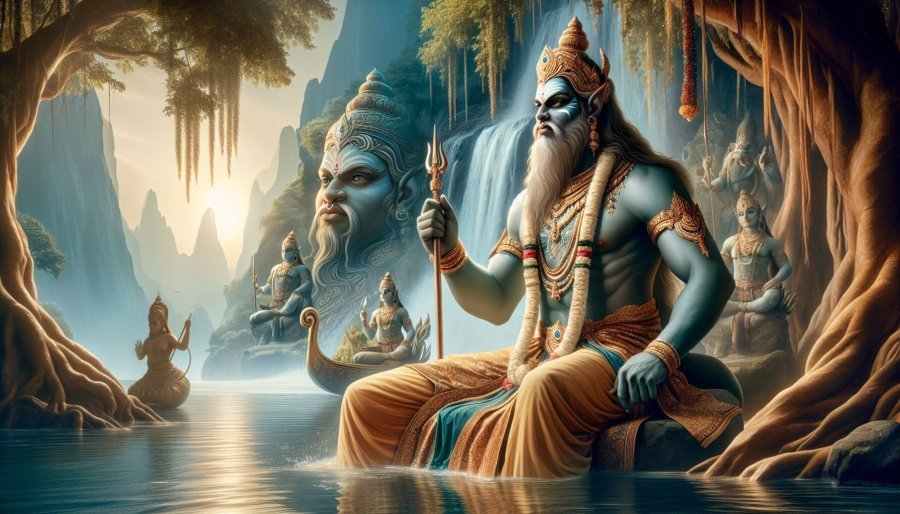Section CLXXII - Pandavas Encounter Gandharva: Arjuna's Battle and Divine Knowledge
Book index: Mahabharata (English)
This page contains a summary of the Mahabharata Section CLXXII including examples of moral lessons in daily life. The Maha-Bharata is one of the largest epics ever written containing roughly 100,000 Sanskrit verses. It deals with the legendary history of ancient India and contains a large number of interwoven tales.

Short summary of the chapter:
The Pandavas, on their journey to Pancala, encounter the proud Gandharva king Angaraparna bathing in the Ganga. Angaraparna challenges them and attacks with his arrows, but Arjuna defends his brothers and mother using celestial weapons. Eventually, Arjuna defeats Angaraparna, who then offers to teach him the science of illusions and gifts him celestial horses in exchange for his weapon. Angaraparna explains that he censured the Pandavas for not having wives, a designated mode of life, or a Brahmana to guide them, emphasizing the importance of Brahmanas in ensuring prosperity and success in rulership.
Arjuna accepts Angaraparna's gifts and learns about the power of illusions and the significance of Brahmanas in a king's success. Angaraparna admires the Pandavas' virtues, knowledge, and lineage, revealing that he was impressed by their ancestors and the reputation of their preceptor, Drona. He explains that marrying and following the guidance of a learned Brahmana are crucial for a Kshatriya's victory in battles, especially during nighttime encounters. Angaraparna's defeat by the Pandavas highlights the importance of spiritual guidance and adherence to a virtuous lifestyle in achieving victory and success.
Full English translation:
This page is merely a summary which is automatically generated. If you are looking for authentic sources such as the Sanskrit text or the Full English translation of Mahabharata Section CLXXII - Pandavas Encounter Gandharva: Arjuna's Battle and Divine Knowledge, have a look at the following articles:
Section CLXXII, online text
English translation by Kisari Mohan Ganguli.
Read this and other chapters online.
Mahabharata (English Summary)
by Kisari Mohan Ganguli | ISBN-10: 8121505933
Buy the latest edition:
FAQ of Mahabharata, Section CLXXII:
Who was the Gandharva that the Pandavas encountered by the Ganga?
Angaraparna, a proud king of the Gandharvas, tried to block them.
What did Arjuna do when the Gandharva attacked them?
Arjuna used a fiery weapon to burn the Gandharva's chariot.
Why did the Gandharva criticize the Pandavas for approaching the Ganga?
The Gandharva criticized them for not having a Brahmana with them.
What knowledge did the Gandharva offer to share with the Pandavas?
He offered to share the Cakshushi science of illusions and Gandharva horses.
Why did the Gandharva praise the Pandavas' ancestors?
He praises their wise ancestors and their prowess in battle.
What lesson did the Gandharva teach the Pandavas regarding Brahmanas?
He emphasized the importance of having a learned Brahmana as a guide.
Daily life: Pandavas Encounter Gandharva: Arjuna's Battle and Divine Knowledge:
In this captivating narrative, the Pandavas encounter Angaraparna, a Gandharva, while they are on a quest by the banks of the Ganga. An altercation ensues when the Gandharva, who is bathing in the river with his wives, sees the Pandavas approaching and warns them about the sacred timing that belongs to celestial beings. Arjuna, unfazed by the Gandharva's warnings, argues for the universal right of all to access the Ganga, leading to a battle wherein Arjuna defeats Angaraparna. The Gandharva's wife pleads for his life, showcasing the virtues of mercy, forgiveness, and the strength of moral values over mere physical prowess. After being spared, Angaraparna acknowledges his defeat and offers the Pandavas knowledge and celestial horses as symbols of friendship and respect. This action underscores the importance of humility and the exchange of knowledge and assistance as foundations of lasting relationships.
From this tale, several timeless principles can be extracted and applied to everyday life. First, it teaches the importance of respecting natural and sacred times, acknowledging that there is a time for everything, and recognizing the wisdom in ancient customs and practices. Second, it highlights the power of forgiveness and mercy. Even in victory, showing compassion to adversaries can transform enmity into friendship, reinforcing the idea that kindness and empathy are strengths, not weaknesses. Third, the story illustrates the significance of humility and the willingness to learn. Even a mighty warrior like Arjuna recognizes the value of acquiring new knowledge, demonstrating that personal growth and improvement are continuous processes.
Furthermore, the narrative emphasizes the importance of diplomacy and peace over conflict. The Pandavas could have chosen to escalate the situation further, yet they opted for a peaceful resolution, showing that understanding and dialogue are vital in resolving disputes. Lastly, the episode teaches the value of companionship and the strength found in unity. The Pandavas, through their adventures, learn various lessons that reinforce their bond, making them not just stronger as individuals but invincible as a unit.
In conclusion, this ancient story, while set in a context far removed from the modern world, offers valuable lessons on respect, mercy, humility, the importance of continuous learning, the power of peace and dialogue, and the strength found in unity. These timeless virtues, when practiced in daily life, can lead to personal betterment and contribute to creating a more harmonious society.
